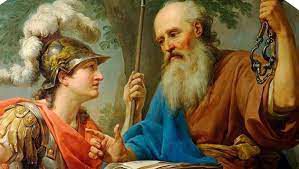Socrates | Brief Biography
Socrates | Brief Biography
Socrates was a classical Greek philosopher who lived in Athens, Greece from 470/469 BCE to 399 BCE. He is widely regarded as one of the most influential figures in Western philosophy, and is best known for his method of questioning, which was called the Socratic Method.
Socrates was born into a modest family and became a stonemason like his father. However, he later decided to pursue a career in philosophy and became one of the most well-known thinkers of his time. He was a contemporary of other famous philosophers such as Herodotus, Sophocles, and Euripides.
Socrates did not leave any written works, and what is known about him comes from the writings of his students, Plato and Xenophon, as well as the philosopher Aristotle. He was known for his method of questioning, which was designed to encourage people to think critically about their beliefs and knowledge. Through his questioning, Socrates aimed to uncover the truth and lead people towards a more virtuous and fulfilling life.
Socrates believed that the pursuit of wisdom and knowledge was the most important thing a person could do and that this pursuit was the path to happiness and fulfillment. He also believed in living a life of virtue and morality and taught that the best way to live a virtuous life was to live a life of inquiry and examination.
Socrates was often seen as a threat to the political establishment in Athens, and was eventually put on trial for impiety and corrupting the youth. He was found guilty and sentenced to death by drinking hemlock, a toxic plant. Despite his death, Socrates‘ teachings continued to be widely read and studied, and he remains one of the most influential philosophers in Western history.
In conclusion, Socrates was a philosopher and writer who lived in Athens, Greece in the 5th century BCE. He is best known for his method of questioning and his beliefs in the importance of the pursuit of wisdom, knowledge, and virtue. He remains one of the most important figures in Western philosophy and his influence can still be felt today. 0 0 0.
N. B. This article originally belongs to the book, ‘Brief Biographies of Ancient Thinkers and Writers‘ by Menonim Menonimus.
Books of Biography by M. Menonimus:
- The World Writers-Brief Biographies
- Introduction to World Writers
- Introduction to World Personalities
- Love of Reputed Persons ..
Additional Searches:











